A Benelux Weekend, Part 1.
I like to tour Europe after most of the English season has completed. You get a couple of weeks in mid and late May when it is possible to see a match practically every day. This season, though, my work schedule has been uncertain and I have found myself unable to book leave well in advance. I will make up for it by trying to find trips in June and July and adding to my countries total.
An uncertain work schedule is not the same as a full one. We are in the commissioning phase of a project, and I often have to wait while mechanical issues are sorted. The result was that on Tuesday, I was cleared for a full week off. Immediately, I am on the internet, looking at fixtures, flights and other schedules. In the end, I select a Eurostar trip to Belgium. This is not the cheapest option at short notice, but Eurostar is a quick and comfortable way of getting into the nearer parts of Europe. I also book a car for all but my first day, meaning this is not going to be a cheap weekend. I am not travelling in France, and barely touching Germany, so rail, where available would surely be cheaper.
My first question is where to leave the car for the trip. My first thoughts were to use Eurostar’s intermediate stations, either Ebbsfleet or Ashford but when I look them up, I find they charge £8 to charge at one and £11.50 at the other per day!! What is the point in putting stations in that are conveniently close to motorways, and then charging extortionate fees to park the car? Anyway, as I also discover, the services to these stations are poor. I want to have the chance to get to a game in England on the day I return, so I decide to look for a place to park to the North of London, settling for a residential road neat Oakleigh Park station near Barnet. A 20 minute ride takes me from here to Kings Cross, meaning I only have to cross the road to pick up Eurostar.
Then it is onwards to Brussels and Antwerp I have pre-booked a hotel by Antwerp station. I have a while to wait at St Pancras before the train, but I am pleased to discover that not only do they provide a row of sockets to plug in lap tops, but that the Wi-Fi service there is free. Wi-Fi services when travelling are odd, insofar as they are either free, or expensive. I have never come across a service where you have to pay, but the charges are reasonable. The good news is that free services are becoming more common. Wetherspoon’s pub chain is a well known place for free connections, and half the motorway services have added themselves to the list.
The Belgium and Netherlands Leagues have completed their fixtures, but this is still my destination. Both countries go in for numerous play offs to decide promotion and relegation issues. Both also have the curious concept of the period championship dividing the season into three, four or even six segments and giving the winner of each part season the title of period champions. Then when it comes to the end of the season, any period champion that has not won promotion automatically will have the chance to try via the play-offs, no matter where they finish in the league. Although it must be possible, I cannot find a case of a period champion finishing in the relegation zone to see what happens then. I know of one Belgium team that had been in financial troubles, but still made the play-offs. They were told they would be automatically relegated one division, but by winning “promotion” by the play-offs, they eventually stayed at their starting point! The number of teams in the play offs is fixed, so the highest placed teams that have not won promotion are used to fill the spaces.
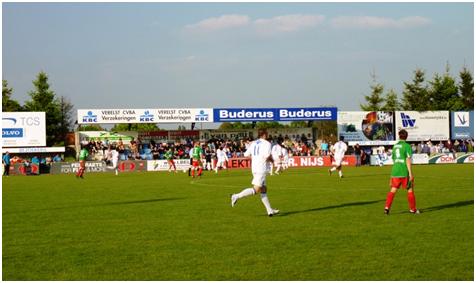
Vossevelden, Katelijne, showing the seating stand.
The Belgium League is organised with a national league of four levels, with progressive regionalisation as you go down. The top two divisions are national, with two sections at Division 3, and four at division four, (which for some reason is called ‘Promotion’). Below this, there are nine provinces, each with their own regionalisation as your drop down. The rule in the National leagues, which I think applies down the levels as well is that only champions get promoted, and everyone else takes their chances in the play-offs although the number of teams competing in any set of play offs differs. In many cases, one team in a play-off series is bidding to hold its place in the higher division. At the bottom of the fourth division, the last three in each group gets relegated, meaning 12 promotion places on offer. All nine provincial champions go up, along with a play off winner from three Antwerp, Brabant and Oost Vlaanderen. I assume these are the most populous regions. The other six provinces also have their own play off, with the winners going in with those teams finishing fourth from bottom in Division Four, in the Interprovincial play offs.
My first match of the trip was to be in the Antwerp provincial play offs. These are two legged knock out games, and despite lower league positions Katelijne and Houtvenne reached the finals with some ease. From Antwerp, I made a 30 minute train ride to Katelijne for the first leg match, followed by a 30 minute walk from the station. It was 7 to get into a fairly typical Belgium ground. Most of the pitch surrounds being a flat path, with about 100 seats in a small stand, and more covered accommodation provided in front of the club house. There is a also a small stand near the entrance, offset from centre behind the goal line. This is one where the roof extends both sides of a central wall, providing cover for both the main pitch, and a second pitch in a single structure. The importance of the match a place in the league for the winners brought out a good crowd, around 500 compared to the average of under 100 you might expect in the provincial leagues, or two to three hundred in the lower divisions of the national league. No programme was issued, but a printed team sheet was freely available.
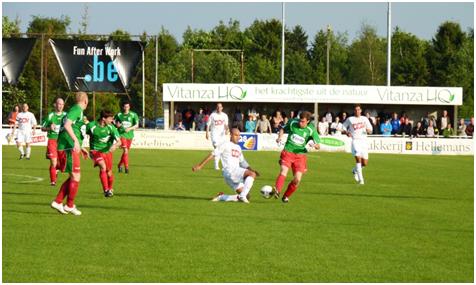
Katelijne in White, Showing the cover behind the goal.
We were treated to an entertaining game the home side made a break through after 12 minutes, but conceded an equaliser just minutes before the break. It was at this point that the Katelijne full back Jon van Dessel became the hero of the hour moving up field to head in a corner as the first half went into injury time, and then repeating the feat 17 minutes into the second period. Houtvenne applied pressure throughout the final half hour, and it is difficult to say how they managed not to pull one goal back, but 3-1 remained the final score. I suspect this match is far from over, and will be looking for the second leg result with interest.
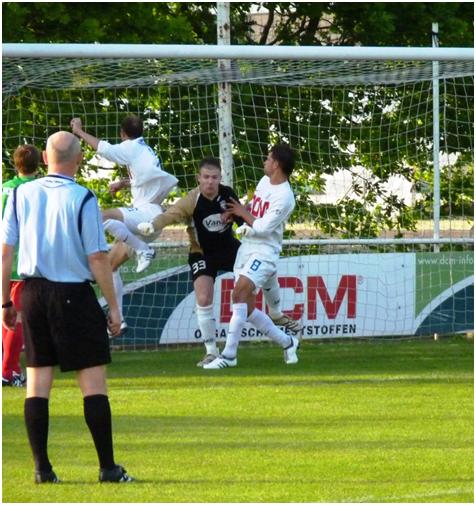
Jon van Dessel leaps to put Katelijne 2-1 ahead.
On Friday morning, I got a rare lie in, leaving my hotel at 11.00 to pick up my hire car and head for Luxembourg. I decided not to take the shortest route (round Brussels), but to go via Liege, and try and find a stopover just south of the city, placing me well for the Saturday, while still being able to return to the hotel before midnight. This was easier said than done even though I was reaching the Ardennes, the bit of Belgium that is not flat and is attractive to the outdoor loving locals, it is not easy to find a hotel, while signs that appear to point to tourist information actually point to town halls. The first hotel I checked appeared open, but deserted. Still it was a three star and looked likely to charge more than I liked. The next was full, citing that this was a holiday weekend and special. Belgium has to bank holiday weekends in a row at this time of the year, so how special? Certainly not for the next one I tried, which was closed completely. I did find a place, slightly further south than I had planned. Considering that 10 km away, all the hotels were full, it appears I may be the only guest at this one.
Once I left my hotel, it was a straight forward drive for about an hour to reach the Luxembourg border but once one crosses the border, confusion reigns. I entered near the town of Rodange, which m map showed as being on the way to Differdange. However, there were no signs pointing the direction to go forward. One street was lined both sides with about 20 petrol stations, and I thought I would be able to glance at a map in one of the attached shops. No one had a map though, and all I could get were unclear directions. One thing was certain once past all the petrol stations I entered France, and I knew I had no intention to be in France, so I turned back before I had gone more than a few hundred meters. There is a football ground with a stand right on the border, probably belonging to Rodange, although the signs were not clear enough to show which side of the border it was on, or if it even straddled the line. Eventually, I found my way, passing my second choice ground of the day, Progres Niedercorn en route. Unfortunately, with two teams fighting out for the title on the final day of the season, I had already been to both. Jeunesse Esch starting with a single point lead over F91 Dudelange. Progres were in 11th place in a 14 team league, which meant they needed to maintain their position to avoid a relegation play off. UN Kaerjeng are otherwise in the play-off spot, while US Rumelange (at Jeunesse Esch) and Mondercange (at Progres) were relegated. That left the question of the other European slots. Obviously whichever team won the league go into the Champions League, and the runners-up into the Europa League, but third place also gets a try at the Europa League (and of course the cup winners, but that is still to come, as both the semi-finals and final are in the next week).
Racing FC Union Luxembourg are in third place, but FC 03 Differdenge are only two points behind, and these two teams were to meet on the final day. The catch for Differdenge is that they do not start the day in fourth, but sixth place. Both Fola Esch and Grevenmacher are a point ahead. Now, quite a few Luxembourg grounds have been modernised in recent years fortunately, the Stade de Thillenberg is not one of them. This is a gem, one of the most interesting grounds I have visited in years. One approaches the ground up a steep hill, and under a bridge, gaining a glimpse above of a brick wall, (looking as if it may fall down the hill at any moment), and the back of the stand. A corner of the ground is up on concrete pillars, with a ten foot drop below, and then you round the corner to see the entrance gate.
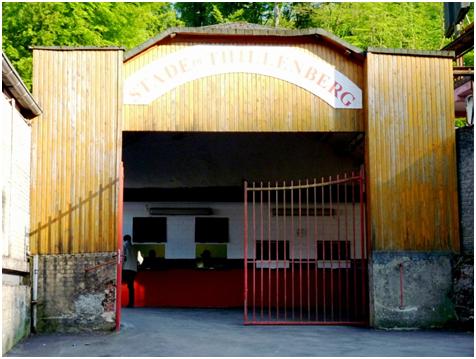
Stade de Thillenberg the gate.
I do not think I have ever seen anything quite like this. What you can see behind the gates are the pay booths, were for 7, you are given a piece of coloured paper with a pattern on it, but no discernable information. A part if this ticket is perforated and torn off seconds later as you enter the stadium. Also on offer is what appears to be an A4 programme, but on closer inspection is actually a season brochure, with all the details for the season. Pre-printed at the start of the season, it does not include a late change with this set of fixtures being set for 8 days later. Most of the magazine is in French, as are most of the posters and adverts around the ground, and also the language spoken by the locals in this area. The fixture list is given in French (copied straight from an official document, I guess). However, everywhere else, the name of the home club is not in French, nor German, (the other widely spoken language of the country). Instead it is in Luxembourgish, and so FC 03 Differdange becomes FC 03 Deifferdeng. The same goes for the visitors, whose club badge describes them as Racing Football Club Union Lëtzebuerg. Inside the magazine, the home team are describe as a merger in 2003, between clubs known as AS Differdange and Red Boys Differdange. Red Boys provided the away team on my first visit to the Grand Duchy, buck in 1989. The Luxembourg team is also a merger, and even more recent between clubs previously known as Racing and Union hence the now rather long title to include both names. No wonder most people abbreviate it to RFCU.
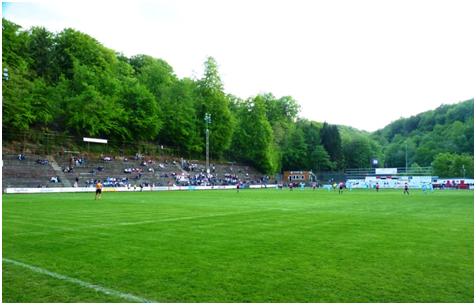
Showing the large scale of terracing.
The ground has been built by re-shaping the side of a hill, and on the hillside is a magnificent terrace of about 20 quite steep concrete steps. They show some sign of age, but are in general good condition. While this allows anyone who want to stand to do so, most people sit on the concrete often with a beer bottle close at hand.
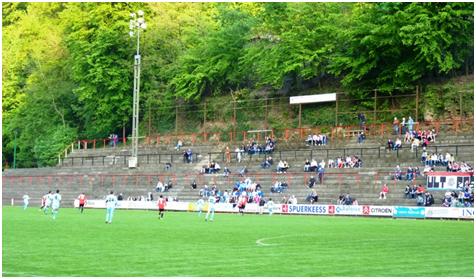
But without doubt, the feature that makes this ground is the main stand. This is mainly of wooden construction, with a steel superstructure and is something special
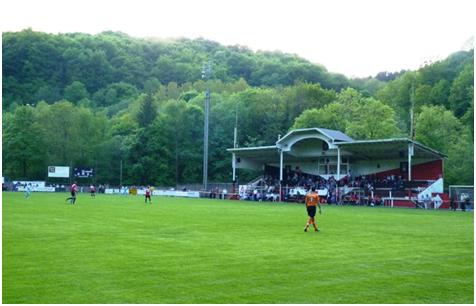
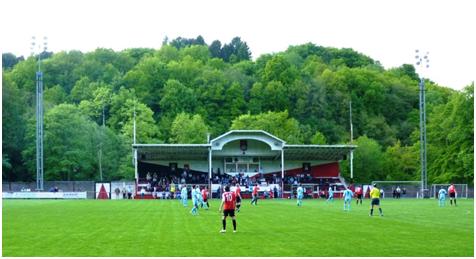
Deifferdeng, playing in a 4-2-3-1 formation took the lead on 15 minutes, when their lone striker, Pierre Piskor scored. The first half was a close affair, and the decisive action came just before half time. It was not another goal, but a serious foul perpetrated by RFCU’s Damir Muhovic. As a result, the injured player, Ibraham Diop was not to return to the pitch, while Muhovic was given the red card he deserved and also left the action. Within three minutes of the restart, Piskor scored again, and then only some luck saved RFCU from another goal (for a short time), the hat-trick being prevented by first the goalkeeper’s foot, and then a narrow miss minutes later. When Deifferdeng did score their third goal, on 69 minutes, it was the substitute, Aurelien Jochim who scored. Jochim added another on 76 minutes as the game turned into a rout. Piskor finally completed his hat-trick a minute later, while Alessandro Alluni and Jean Wagner (both of whom had come on as substitutes) added late goals. Wagner getting the 7th and last from the spot
Unfortunately for Deifferdeng, despite doing their own bit, and finishing a point above RFCU, the other results did not all go their way. Fola Esch could only draw at Dudelange, which sent the title to Jeunesse, and also left Fola outside the Europa League placings, but Grevenmacher won 3-1 at Etzella Ettlebrück and took third place. Still there is something left in the season for Deifferdeng. On Tuesday night they play Etzella in the cup semi-final, while Grevenmacher play Fola Esch. The eventual cup winners take the remaining Europa League place. For Deifferdeng, this provides to chances they are in Europe if they win the cup, or if Grevenmacher do so. It is a pity though that even for a qualifying round match played in front of not many more than the 420 given as the crowd against RFCU, UEFA will deem the ground as unsuitable, and force it to be played elsewhere.